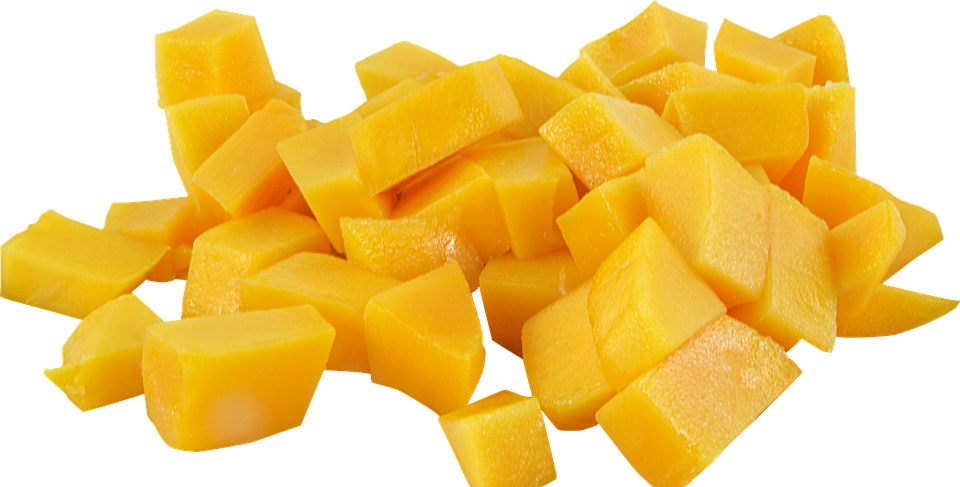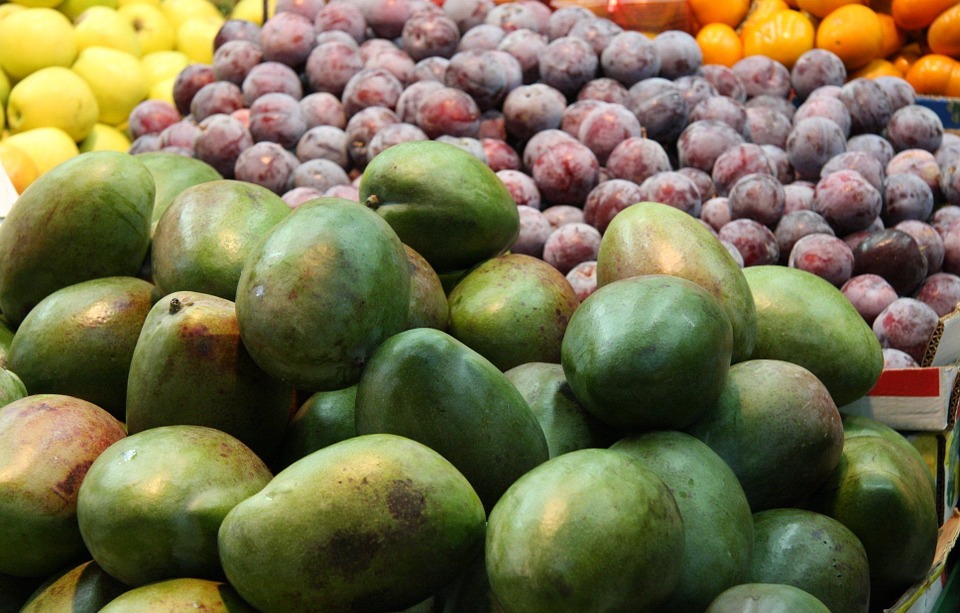This article delves into the world of rabbit nutrition and the question of whether mangoes, a beloved tropical fruit, are suitable for these furry companions. We will explore the nutritional profile of mangoes, dissect the potential risks and benefits for rabbits, and provide a detailed guide on how to introduce mangoes into your rabbit's diet, if at all.
Part 1: Unveiling the Nutritional Powerhouse: Mangoes

1.1 A Rich Source of Vitamins and Minerals
Mangoes are a nutritional powerhouse, boasting an array of vitamins, minerals, and antioxidants. Here's a closer look at their key components:
- Vitamin A: Essential for maintaining healthy vision, skin, and immune function. Mangoes are a good source of beta-carotene, which the body converts into Vitamin A.
- Vitamin C: A potent antioxidant that protects against cell damage and supports the immune system. Mangoes are a decent source of Vitamin C, particularly in the skin.
- Vitamin K: Crucial for blood clotting and bone health. Mangoes contain a moderate amount of Vitamin K.
- Potassium: A vital electrolyte that regulates fluid balance and plays a role in muscle function. Mangoes are a good source of potassium.
- Fibre: Promotes digestive health and regularity by adding bulk to stools. However, the fibre content in mangoes is relatively low.
1.2 The Sugar Side of Mangoes
While mangoes offer valuable nutrients, they are also relatively high in sugars, primarily fructose, glucose, and sucrose. This is an important factor to consider when considering mangoes for rabbits.
Part 2: The Unique Dietary Needs of Rabbits

2.1 Herbivores with Specialized Digestive Systems
Rabbits are herbivores, meaning their bodies are designed to thrive on a diet primarily composed of plants. Their digestive systems are highly specialized, efficiently processing high-fibre, low-sugar diets.
2.2 Essential Nutrients for a Thriving Rabbit
Rabbits require a specific blend of nutrients for optimal health. These key nutrients include:
- Fibre: The cornerstone of a rabbit's diet. It supports healthy digestion, promotes gut motility, and prevents hairballs.
- Vitamin C: Important for immune system function and connective tissue health. Rabbits cannot synthesize Vitamin C, so it must be obtained through their diet.
- Vitamin K: Crucial for blood clotting and bone health. Rabbits need a consistent supply of Vitamin K.
- Calcium: Supports bone health and growth, especially in young rabbits. Hay is an excellent source of calcium for rabbits.
- Potassium: Regulates fluid balance, crucial for overall health.
Part 3: The Potential Risks of Mangoes for Rabbits
3.1 The Sugar Dilemma: A Threat to Rabbit Health
Mangoes' high sugar content poses a significant risk to rabbits. Excessive sugar intake can lead to:
- Weight gain and obesity: Excess sugar is readily converted into fat, leading to health complications.
- Dental problems: The sugars in mangoes can contribute to tooth decay and overgrown teeth, requiring veterinary intervention.
- Metabolic issues: Over time, high sugar intake can lead to insulin resistance and even diabetes.
- Digestive upset: Mangoes' sugar content can disrupt a rabbit's delicate digestive balance, leading to diarrhoea, gas, and bloating.
3.2 The Digestive Challenge: Potential for Gut Issues
While mangoes have some fibre, their high sugar content can disrupt a rabbit's delicate digestive balance. This can result in:
- Gastrointestinal stasis: A life-threatening condition where the digestive system slows down, leading to complications like dehydration and potentially death.
- Bloating and gas: The fermentation process in the rabbit's gut can be impacted by high-sugar foods, resulting in uncomfortable bloating and gas.
- Diarrhoea: An upset digestive system can lead to diarrhoea, which can quickly dehydrate a rabbit.
3.3 Sensitivity and Potential Toxicity
While rare, some rabbits may exhibit sensitivity to certain components in mangoes. This can manifest as:
- Allergic reactions: Skin rashes, digestive upset, or other allergic symptoms can occur in sensitive rabbits.
- Sensitivity to mango skin: The skin of a mango can irritate a rabbit's digestive tract. It's crucial to remove the skin before offering any mango to your rabbit.
Part 4: The Limited Benefits of Mangoes for Rabbits
4.1 Antioxidant Potential: A Silver Lining
Mangoes are rich in antioxidants, which may offer some protection against oxidative stress and free radical damage. These antioxidants can support overall health and potentially slow down the aging process.
4.2 Vitamin and Mineral Content: Alternative Sources are Better
While mangoes contain some valuable vitamins and minerals, these can be easily obtained from other, safer, rabbit-friendly foods. There's no need to risk the potential downsides of mangoes when other options exist.
Part 5: The Ethical Dilemma: To Feed or Not to Feed
Given the potential risks associated with mangoes, it is generally not recommended to feed them to rabbits. However, if you decide to offer mangoes, proceed with extreme caution and follow these guidelines:
5.1 Consultation is Key: Seek Veterinary Advice
Before introducing any new foods, including mangoes, to your rabbit's diet, always consult with your veterinarian. They can assess your rabbit's individual health, history, and provide tailored advice based on their specific needs.
5.2 Start Small: A Tiny Taste Test
If your vet agrees to a mango introduction, begin with a tiny piece of ripe mango, no larger than a pea. Observe your rabbit carefully for any signs of adverse reactions, such as digestive upset, lethargy, or skin irritation.
5.3 Gradual Introduction: A Step-by-Step Approach
If your rabbit tolerates the initial amount, gradually increase the portion size over several days, monitoring their reaction closely. Observe their behaviour, appetite, and stool consistency.
5.4 Ripe Mangoes: Soft and Sweet
Choose ripe mangoes that are soft and sweet, as they are easier for rabbits to digest. Avoid unripe mangoes, which are harder and may cause digestive upset.
5.5 Remove the Skin and Pit: Safety First
Always remove the skin and pit of the mango before offering it to your rabbit. Both are potentially harmful and should be avoided.
5.6 Limit Frequency: Occasional Treats Only
Mangoes should only be offered as an occasional treat, in small amounts. Never replace their regular diet with mangoes, as this can lead to nutritional deficiencies.
Part 6: Safe Alternatives to Mangoes: A Bountiful Feast
There are numerous safe and nutritious fruits and vegetables that you can offer your rabbit as treats, providing them with essential nutrients without the risks associated with mangoes.
6.1 Fruit Delights: Sweet and Healthy Options
- Bananas: In moderation, bananas can be a tasty treat. Choose smaller, less ripe bananas as they are lower in sugar.
- Strawberries: A good source of Vitamin C, strawberries are a popular choice for rabbits.
- Blueberries: Low in sugar and rich in antioxidants, blueberries are a healthy option for rabbits.
- Raspberries: Similar to blueberries, raspberries are low in sugar and offer various nutritional benefits.
- Apples: Always remove the seeds and core before offering an apple to your rabbit.
- Pears: Similar to apples, remove the seeds and core before offering pears to your rabbit.
6.2 Vegetable Variety: A Rainbow of Options
- Celery: A crunchy and refreshing treat for rabbits.
- Carrot Tops: The leafy greens of carrots are packed with nutrients and are often more appealing than the root itself.
- Parsley: A good source of Vitamin C and other nutrients, parsley can be a tasty addition to your rabbit's diet.
- Spinach: In moderation, spinach can be a good source of Vitamin K and other nutrients. Monitor your rabbit for any signs of digestive upset.
- Kale: Similar to spinach, kale should be offered in moderation and monitored for potential digestive issues.
- Bell Peppers: Sweet bell peppers are a good source of Vitamin C and other nutrients.
- Cucumber: A refreshing and hydrating treat for rabbits.
Part 7: Addressing Common Concerns: FAQs
7.1 Can I Feed My Rabbit Mango Skin or Pit?
Absolutely not. Mango skin and pit are potentially toxic and should never be given to rabbits. They contain compounds that can cause digestive upset and other health problems.
7.2 Can Baby Rabbits Eat Mangoes?
It is not recommended to feed mangoes to baby rabbits, as their digestive systems are still developing. Their delicate gut is not equipped to handle the high sugar content and potential risks associated with mangoes.
7.3 Can I Feed Dried Mango to My Rabbit?
Dried mango is even higher in sugar than fresh mango and should be avoided altogether. The dehydration process concentrates the sugars, making it a particularly unhealthy option for rabbits.
7.4 My Rabbit Ate Some Mango, What Should I Do?
If your rabbit has eaten mango, monitor them closely for any signs of adverse reactions, such as digestive upset, lethargy, loss of appetite, or changes in stool consistency. If you notice any concerning symptoms, consult with your veterinarian immediately.
7.5 Can I Feed Mango to Other Small Pets?
The information provided in this article applies specifically to rabbits. It is essential to consult with a veterinarian regarding the safety of mango for other small pets. Different species have unique dietary needs and sensitivities.
7.6 Are There Any Specific Types of Mango That Are Safer for Rabbits?
No, all types of mango pose similar risks to rabbits due to their high sugar content. The variety of mango does not significantly alter the sugar content or the potential dangers for rabbits.
Remember, your rabbit's health and well-being are paramount. Choose safe and nutritious foods to ensure their happy and healthy life.
Everyone is watching
-

Do Rabbits Lay Eggs? (The Surprising Truth)
OTHER TYPES OF PETSThis article will unravel the common misconception that rabbits lay eggs, exploring the fascinating world of r...
-

What's a Group of Rabbits Called? (A Comprehensive Guide)
OTHER TYPES OF PETSThis article delves into the fascinating world of rabbits, exploring the various terms used to describe a grou...
-

Can Rabbits Eat Grapes? A Guide to Safe Rabbit Treats
OTHER TYPES OF PETSThis comprehensive guide will explore the safety and suitability of grapes for rabbits, providing detailed inf...
-

Predators That Hunt Rabbits: A Guide to Natural Enemies
OTHER TYPES OF PETSI've always been fascinated by the circle of life, that delicate dance between predator and prey. Growing up ...
-

Are Rabbits Nocturnal Animals?
OTHER TYPES OF PETSThe question of whether rabbits are nocturnal animals is a fascinating one, with a surprisingly complex answer...
